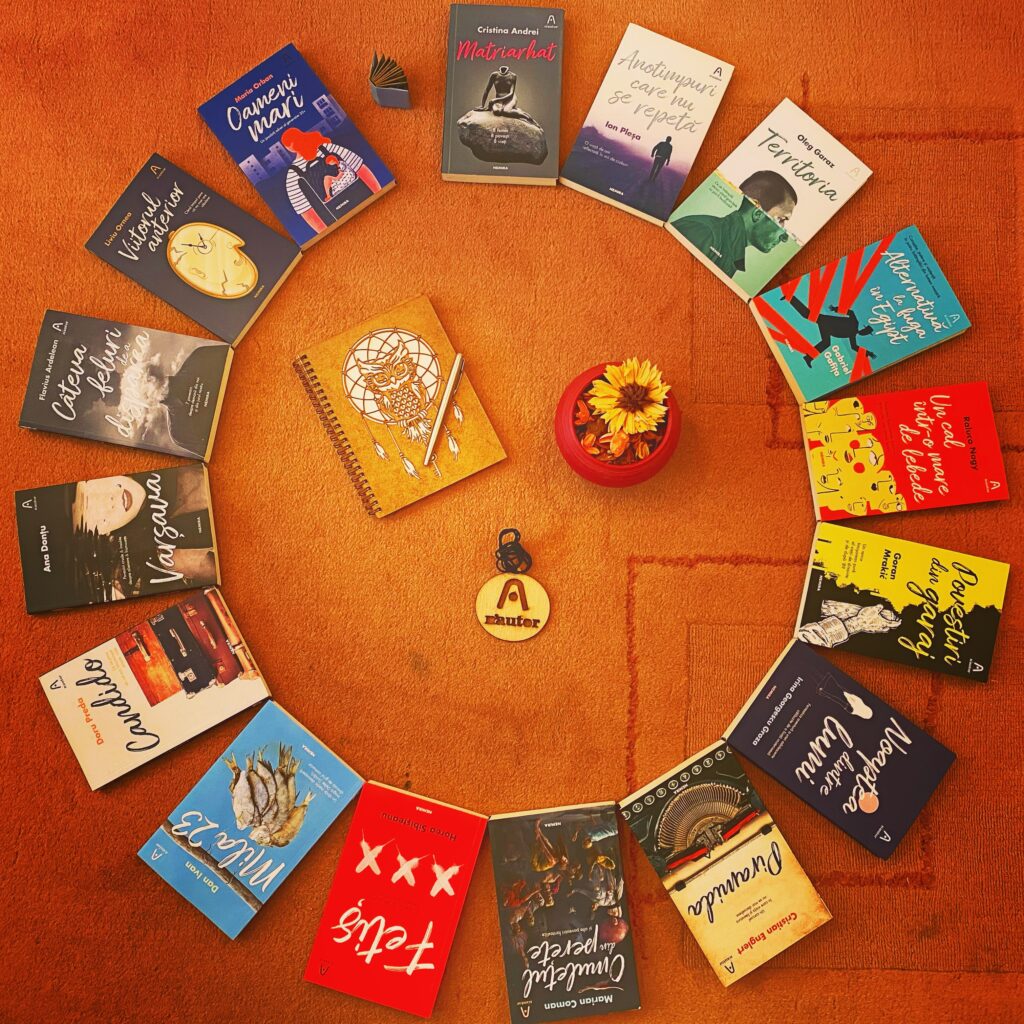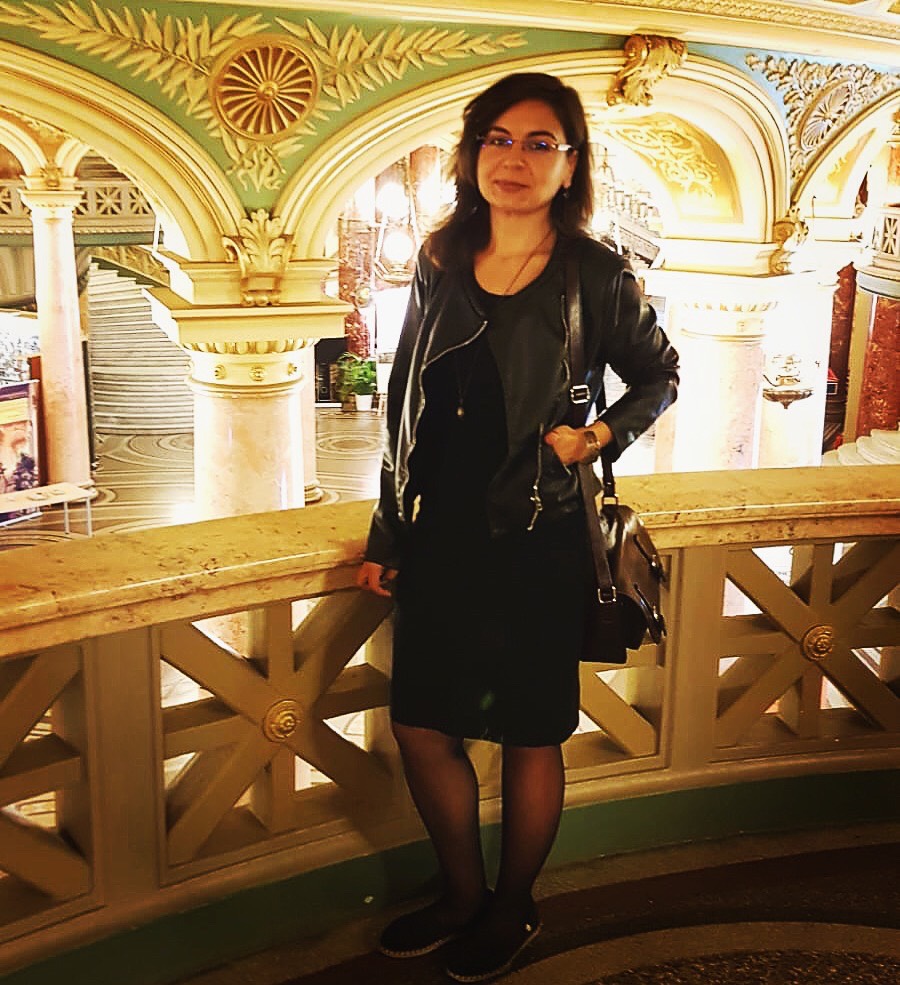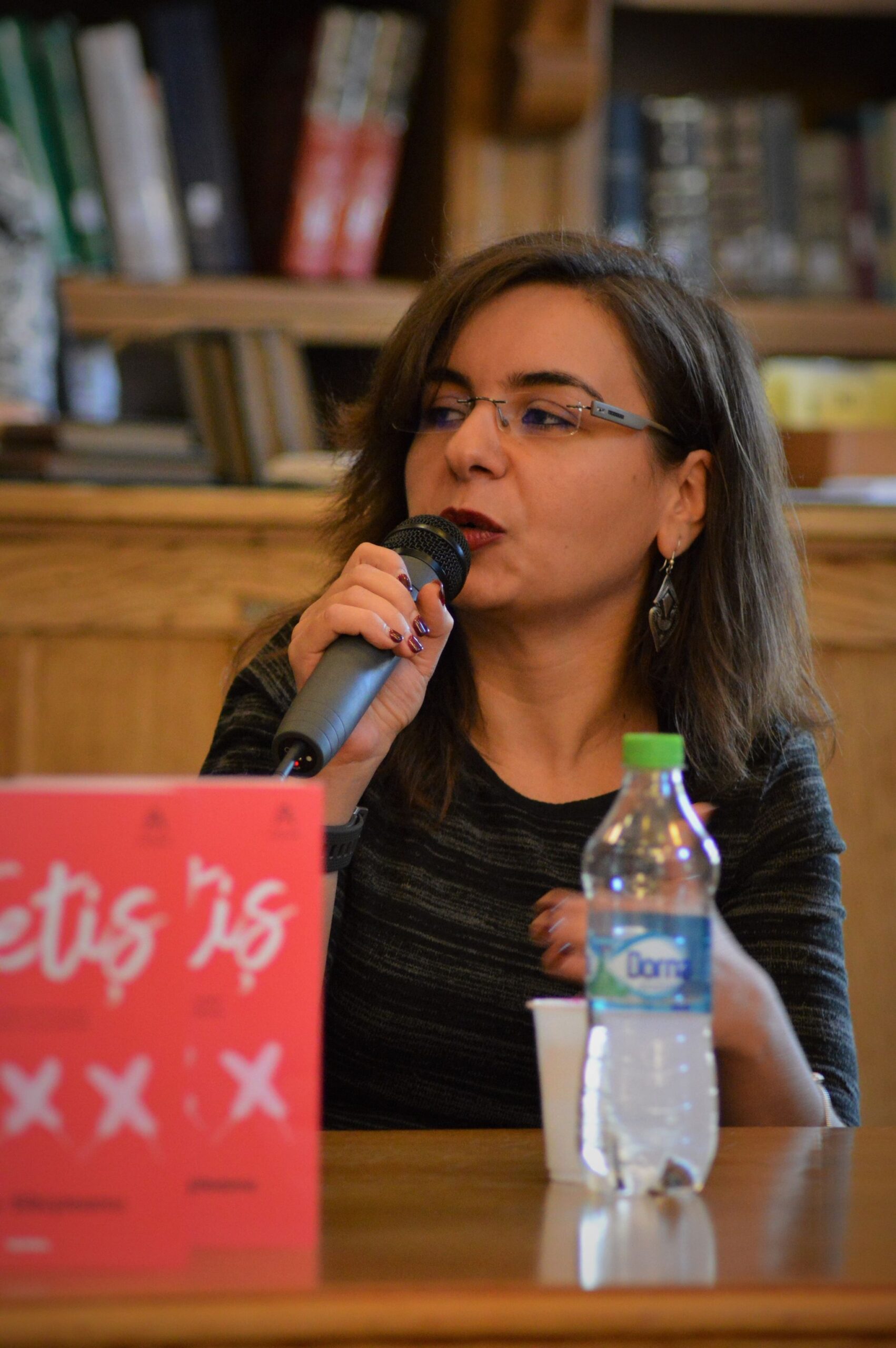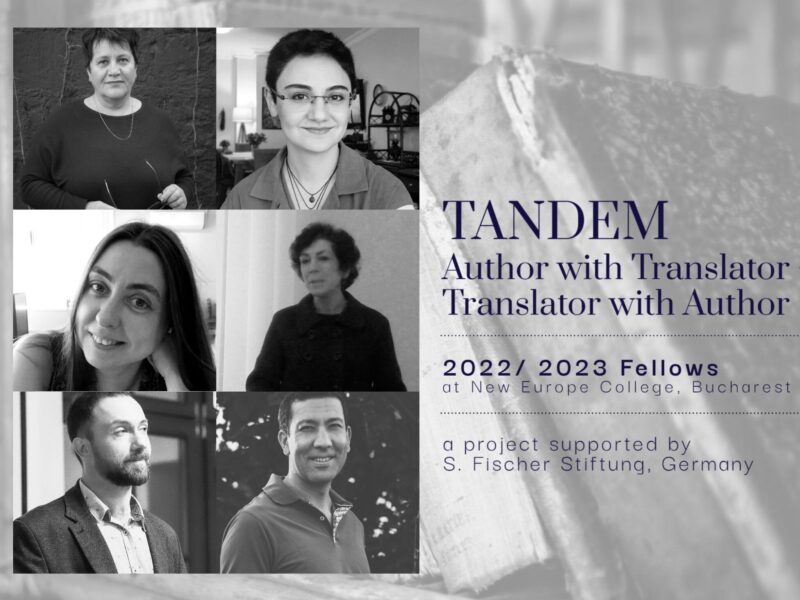Eli Bădică is the editor and coordinator or n’autor collection of Nemira Publishing House. She collaborated with various cultural magazines and platforms, Suplimentul de Cultură, DLITE, Bookaholic, Arte și Meserii. She is a PhD candidate of the University of Bucharest and has supernatural powers which enables her to read all the good books, to attend the coolest literary events and to be in touch with everything new in the book industry. And there’s more.
I'll start with the game in which you caught the n'authors ’authors on the Nemira blog and I'll take over a question from "Cărțile care au scris oameni" [Books which wrote people]. What is the book you would’ve liked to write?
Ha, I think the n’authors feel "revenged" right now, given the fact that I’m constantly tormenting them with all sorts of questions / curiosities / challenges.
Of course, there is not just one book, the Book, so to say, but it would be rather about all those books that I’ve been loving throughout time, those books that have kindled "envies" within me (to be read “admirations”, in fact), those books that, in one way or another, are part of me today. And, so it won’t look like I’m running in circles, I'm going to give an example: The Little Prince. I’ve read it relatively recently – not during my childhood, because back then I didn't really have access to books and I didn’t receive many reading guidance either. I read on my own what I could, so I caught up with it late, after I had heard only superlative talk about it - and it completely charmed me, I understood why it was so loved by generations of readers and why it’s a reference in literature. It's one of the volumes I go back to when I need a touch of beauty. And it seems almost a sacrilege to me (I don't use this term in vain, I see literature as a kind of personal religion) to say that this is one of the books I would’ve wanted to write, I don't think I would’ve been able / would be able to write not even a single line from it, but if we’re playing…
How did you get to work at Nemira and take care of the "n’autor"collection? Given your experience until 2017-2018, at least as seen in the cultural press and on Facebook, it seems that there couldn’t have been a better match.
I'm glad that this is how things look from outside, that it seems natural. To tell you the truth, I would never have imagined that my transit would reach this point. Maybe it was heading for it, but I didn't anticipate it. To be a publisher (like other jobs in the book industry) is one of those professions that’s not much talked about - neither in school nor outside the education system, for various reasons (things I try to change a little, but that's another story) -, so I couldn't have dreamt of being a publisher when I was little - or a teenager, or a student. Or imagine that the profession of reader can be a real one – even more. Instead, I knew I wanted to write. And read. And that's what I did. With a few detours, with a few declines, on different levels, with a few risks taken. Before Nemira, a large part of my activity (from philology, anthropology and journalism) had focused on supporting and promoting contemporary Romanian literature, in which I believed (and still believe) very much. From that moment on, more and more proposals came. I can only suspect that the proposal of Ana Nicolau, the general manager of Nemira, to coordinate a collection of contemporary prose written by Romanian authors at the publishing house she’s running came on the same way. In the meeting I had then - in the spring, in her office at the headquarters - she proposed three projects to me, but this one represented the stake of the discussion. After a (short) time (of thinking, turmoil and questions), I joined the Nemira team in early June 2017, on this project that would become "n’autor". I’m grateful for the trust I’ve enjoyed from the first day until now, "n’autor"’autor" becoming an overwhelming joyful part of my present life.
Before joining the Nemira team, you collaborated with literary magazines, you did cultural journalism, you collaborated with associations, you volunteered. What is, from your point of view, the importance of volunteering in building a career? How did it help you?
I think that volunteering is extremely relevant, not only in building a career, but also in building a person's identities.
I’ve been volunteering since I was a child, concomitantly with all sorts of extracurricular activities and, later, work programs, from my own initiative, in an attempt (almost unconscious at first) to support some models (teachers, for example), some (micro) communities, to set off certain contexts even the smallest change, but also to learn and understand more. In retrospection, I realize I’ve never had any hidden interests, any agenda, any specific target other than those listed earlier, I did not want for a moment to "check" something in a resume, I did not aim to form any sort of connections etc. (not that I would impose a grid of value judgments on this grounds). All these years of volunteering have shaped me, directly or indirectly, they have poured themselves, together with everything else, into who I am today, beyond my professional transit, and this is the result of consecutive (both positive and sometimes negative) interactions with people from various fields, with different levels of experience, with different perspectives, with multiple plans and projects.

With "n’autor"’autor" you haven’t only put together a very good collection of Romanian literature pieces, but it seems to me that you’ve created a standard of author-editor relationship and that you’ve raised a lot the expectations, because your interaction with the writer doesn’t end when you send the manuscript to print, but you get involved in promoting the books (if I’m thinking only of the tours you’ve participated in before the pandemic), in reaching a new public (meetings with pupils and students from different cities). How did this "n'autor culture" come to being? Have you developed it while working on the first manuscript, or did you already have it in mind, thinking that if you were to be an editor, that's how the things are supposed to be?
Thank you very much for the generosity of these remarks, I’d be thrilled and beyond if that would be the case.
It would’ve been impossible to have these things in mind for the eventuality that I would have been a publisher at some point because, as I said earlier, this possibility did not even cross my mind. But before Nemira, I had taken dozens, hundreds of interviews with Romanian writers, I had written hundreds of articles about the publishing field, I had been to the most important literary festivals in Romania, to national and international book fairs, I had participated in round tables, I had moderated hundreds of literary and cultural events and so on, where I had fully exercised a sense: that of listening. And a technique loved by anthropologists: participatory observation. So I sensed what the wishes were, I knew (some of) the weaknesses of the industry. And before launching the collection I had some time (from June 2017 to the beginning of 2018) to think about its editorial direction - intensively discussed with Ana Nicolau - and to put together what I would’ve liked to happen with it. Things layered slowly - some I clarified then, others along the way, at the moment I had to deal with them. Luckily, I have a wonderful team beside me, which has always been close to me.
Indeed, this was one of the main goals: a different author-editor relationship, but also authors-readers and author-author. We wanted to build communities, to unite the ranks, to create a sense of solidarity. So that writers are not completely alone (before and after publication). And neither do the readers. I wanted to accompany the authors in all the stages, to be close to them for all the texts they write, during the (emotional) trials they go through, during the blockages / stumbling blocks; so that there’s a constant. And I tell all these things at the beginning of each collaboration. I think I've concluded thousands of conversations with n’authors with these two words: "I'm here."
Among other things, I was suggested or told outright that “I care too much”, that “I’m too attached to authors”, “I spend too much energy”, “it is / will be irrelevant”. I take it all upon myself. I won’t hide that sometimes it’s a winding road, that costs you a lot, but I believe – also intuitively – with all my heart in it.
You were saying in an interview about two years ago that you receive almost daily a manuscript from writers eager to join the "n'’autor" collection. Is the pace the same? Do you manage to get through all of it?
Yes, the pace is the same; there are still lots of manuscripts that arrive on every imaginable way: on my personal social media accounts, on professional or personal e-mail addresses, on the publishing house's addresses, in physical format, etc. There are also fluctuations, depending on times and contexts - for example, last year, after the quarantine period in March-May, I received even more.
Of course I manage to get through all of them, but not always in a reasonable amount of time, precisely because I’m not doing just that all day long (reading manuscripts, that’s just a small part of my work), so I appeal more and more often to the understanding and patience of those who send manuscripts, because the answer can come sometimes after a pretty long period.
I assume that your day has 24 hours too and that it would take you at least half of this time to look at the texts that you receive and, eventually, to reply. Do you have a method to assure that you don't miss a future bestseller?
I keep filling requests for my day to be increased at least with 10 hours, but they’ve been turned down so far. This is the situation, I persevere.
Leaving the jokes aside, I don't knowledge of a recipe to assure me I’m not going by something relevant, a bestseller, as you say, or a masterpiece, the great literary obsession. If someone owns it, I ask him / her to have mercy and send it to me too.
In other words, the only "method", from my point of view, is the text. Everything is there. That is the key. I don't think there's another shortcut. It’s joined by the baggage of personal readings, culture – in the broadest sense possible –, perspectives, editorial direction, editorial plan. And the constant resignation that I may be wrong. I believe neither in certainties, nor in absolute truths.
Has it ever happened to you to find authors to publish among those who sent you manuscripts like that? Or how’s the recruiting process work, giving the fact that some of them debuted as "n’autor"’authors", but others already had books published?
Recruitment seems too strong of a word to me, I’m afraid it will give the wrong impression to some of the (potential) readers of these lines
I was saying above that the text is the only thing that matters. So yes, I’ve also published authors that sent their books to the manuscript address of the publishing house or to my e-mail addresses. The same way I’ve also published writers I knew before Nemira. The doors are open to anyone. And I try, as much as possible, to be objective. That's why I organize the manuscripts in such a way that when I start reading them I don't have the author's name; I don't start with preconceived ideas, with expectations. When collaborating after we’ve already published together a first book, things are slightly different.
Were there cases in which you really wanted an author in the collection and you brought him or her the idea of collaboration?
There are many writers that I read with great joy and with which, of course, I’d love/would have loved to collaborate. But I would never go (although as it was, "never say never"?) to them, from a single reasoning ... ethical (I know, dusty, what ethics?): It would not seem fairplay fair play to their previous publishers, to the colleagues who worked with the respective authors (the writer's work is solitary up to a point, then we are talking about an entire team), to the resources they allocated / invested and so on. I have too much respect for the community, with all its shortcomings (including ethical ones). I prefer to leave the doors open, as I said - because the gravity center of the discussion changes if the authors come from their own initiative to “n’autor"’autor”, for various reasons. Or if we are talking about specific projects, outside the collection.
As an editor who goes through most of the production phases of a book, which one do you find to be the most difficult?
The most difficult phase for me by far seems to be the editing, because that’s the moment you take some (almost) final decisions, you suggest some changes, you influence the final form. I feel that this is the moment when I enter the core of the text, when I try to see every breath, every syncope, every hesitation, to understand its rhythm, its silences, its meanings, to see what is extra and what is missing and so on. This phase consumes me enormously - for example, sometimes I spend a lot of time thinking about a comma, a phrase, a scene, etc. But it is also very nice to have this privilege to approach one of the most intimate parts of a writer, to live in the middle of the story.
It's not really easy even when, in the DTP phase, endless hours of words split in syllables stick to my brain - because I check the end of the lines again and again, before the volume goes to be printed - whatever I’d do, whatever I'm told, I spell continuously. And when the book is in bookstores and it has mistakes, which I either discover with horror, or others tell me / inventory them, sometimes with satisfaction, sometimes passive-aggressively; and it’s of no relevance to anyone that you have read it countless times, until your eyes caught fire, that you prevented other ones. You missed something that now seems blatant. Or when, after all, you can't (completely) influence the fate of a book. And many, many more.
What about the one who brings you the greatest satisfaction?
I think there are three stages here, at the same level: the first, the one in which, after tens, hundreds of manuscripts, I find one that I think is very good; then I'm over the moon, I feel like I imagine someone who discovers a diamond in a mine or who wins the lottery must feel. The second is the one mentioned earlier: editing (a paradox, yes). And third, when I get feedback on a published book - whether it's in the form of a message from a reader, a colleague, or it's a chronicle, a blog post, a note, a justification from a professional jury, etc.
At a first glance, working on the text with writers seems a rather difficult matter, talking about the myth of immeasurable egos. What are the most useful strategies to reach common ground? Or who gives up more?
I didn’t concretely measure who yields more. I like to think, in fact, that we meet at the middle. Communication seems the best strategy to me. Accompanied by diplomacy and coherent explanations for each proposal. I always try to create space for dialogue, to be able to discuss everything, even when we have different opinions. Sometimes the author convinces me of an issue, through the arguments or justifications he offers me, other times it happens the other way around.

Along with the effort and enthusiasm of you and your colleagues at Nemira, I believe that the authors' willingness to go out in public, to appear in the public eye and to attract a new audience or to maintain their interest is also important. How do you persuade reluctant writers to adventure themselves in such experiences?
You're absolutely right, it's essential.
I confess that I did not encounter any reluctance, I’ve always discussed these things (also) at the beginning of each collaboration, I argued their importance and relevance in the times we live in and I was always welcomed with understanding and similar enthusiasm. I/We go to authors with many (quirky) ideas, even after a certain time after the publication and the initiatives are always welcomed and appreciated positively, they are aware of the required efforts. It happens that sometimes some of them are not available to respond affirmatively to an invitation, but this is rather a circumstantial matter.
How necessary is a writer's interaction with his or her readers, be it online, offline, in writing or just in pictures on Instagram? In other words, is what happens to a book after publication only the responsibility of the publisher?
There are very rare cases when a book catches a wave without the visible involvement of the writer – I’m thinking of Elena Ferrante, for example. Exceptions. "Accidents." Otherwise, it’s a real need of interaction, readers have curiosities, they want to know what writers do, what rituals they have, what they think, what plans they have, they want to feel involved in this whole process, to hear them, to see them etc.
No, I don’t think that what happens to a book after publication is only the responsibility of the publisher - although of course it plays a big part - the author must be present as much as possible. I am aware of the opinions according to which the author ended his/her “mission” once he/she finished writing, that he/she said everything there, that he/she has nothing to add. Unfortunately or fortunately, as everyone wants to take it, today it’s not possible. I know many great books that are almost unknown because the authors are extremely discreet people, withdrawn from the public life. And the opposite, very weak books that are bestsellers because those who wrote them are very dedicated, constantly "maintain" their audience.
And the other side of the coin is the reluctance of the publishing houses' management to promoting campaigns, considering such investments unjustified. How do you obtain approval for budgets for tours or other events concerning "n'’autor"?
Like many other of your questions, this is a delicate and nuanced one.
First of all, your statements are largely in line with our book market. But the investments in contemporary Romanian literature are, in an overwhelming proportion, financially unjustified. In other words, the expenses related to staff, promotion, transport and accommodation in a tour, for example, are not covered, even partially, by the actual sale of a book (the price of which, let us not forget, contains percentage of distribution, staff costs, printing, copyright, etc.). And that's because the public that participates and buys a book at such an event is still small.
On the other hand, these investments can be justified in terms of visibility, the creation and consolidation of communities and relationships (author-reader, author-author, publisher-author, etc., which we talked about earlier), of lasting collaborations, of punctual interventions, of promotion on another level, more personal, closer to the public, etc. All of this with the hope that these efforts will be justified in the future from a financial point of view too.
This is also the perspective (in detail, it’s, of course, extended and customized for each situation) that I use whenever budget approval is needed. Luckily, Ana Nicolau has a pro-promotion perspective, so to speak, she assumed this mission from the beginning with contemporary Romanian literature, so we always got to an agreement.
We were talking above about bestsellers. From your point of view, what do you think is the moment when a book becomes a bestseller?
This notion of bestseller is still almost funny (if not dramatic) in our country, because we don't have much concrete data and this beach is extremely broad: there is a talk of a book being well sold from two to three thousand copies and up to tens of thousands of copies. Probably ten thousand copies would be a good average for a volume to be considered an undisputed bestseller.
For me, a book is a bestseller the moment it has many echoes on the market, both from readers and from other writers, critics, book professionals, when it’s constantly present on the market and we reprint it.
At the agency, when we have an international hit, in order to make it known to the publishers and to show them how strong it’s going, we tell them about how many copies it has sold, in how many territories it was translated, where it’s found in The New York Times top (or something similar), what reviewsfrom famous people (writers or not) it received, what awards it received and so on. Getting back to the question, what are the tools in Romania that really matter in building a portfolio like this? How much do the sold copies matter (given the fact that we rarely find out figures from publishers - for sometimes plausible reasons), how much do chronicles, prizes, etc. matter?
Romania hasn’t reached that level; we don’t have charts that are relevant for foreign publishers, nor instruments of the same caliber that would prove without denial that a book can be valuable for their portfolio. As, by the way, I, as an editor of Romanian literature, do not have the tools that my fellow editors who deal with foreign literature have, regardless of genre, and with the non-fiction from abroad when it comes to me a book.
Of course, the sold copies, the prizes and the feedback from the market are relevant here as well, but they have to be spectacular for us to work outside. In addition, it also matters to be molded on certain topics / themes that the respective market expects / demands. The portfolio also includes the author's participation in national and international festivals, chronicles, opinions of some personalities, etc. But what matters enormously is the first translation (and, as there are so few translators from Romanian...), a single first sign of interest, even a fragmentary one - and here is a vicious circle, the kind of experience that is required at work when you’ve just graduated.
Throughout the last years, other publishing houses have developed or consolidated their collections of Romanian literature. What do you think to be the competitive advantage of your collection, what makes writers to want to remain n’authorsor to want to become one?
And that’s a wonderful thing, I am very happy, I just hope it lasts (the pandemic crisis has already shut down some collections, unfortunately), to be supported by readers and to grow, so that, in time, Romanian authors can write in more decent conditions, the publishing houses to be no longer in short supply and we all to enjoy a quality literature.
Before competitiveness, I think we need, I repeat, solidarity; otherwise, the competition is in vain, a sham.
I hope that "n'’autor" (could) attract through its selection, through the freshness it offers, through its team, through its vision, through a different way of collaborating, through a tailor-made promotion on the collection's books, through the community too.
We met a few years ago on the plane to Frankfurt, where the book fair was taking place. How did the experience in Frankfurt help you in what followed at the publishing house? Or in the rest of your projects.
I fondly remember our meeting from back then and the emotions I’ve confessed to you. It was the first time I was going to Frankfurt, and the plane was full of literary agents, publishers, translators, cultural managers, etc. Romanians.
In July 2016, I had received the proposal to represent Romania in a study tour at the Frankfurt International Book Fair, through the guest program of the Federal Republic of Germany. I accepted with honor and gratitude the proposal from the Goethe-Institut and then, through the German Embassy in Bucharest, a file was drawn up and the "candidacy" was submitted. Romania was among the selected countries and so in the autumn of that year I was among the twenty-two participants from around the world, indeed, writers, cultural / literary journalists, publishers, literary agents, representatives of profile associations, etc. from Angola, Argentina, French Riviera, Cyprus, Estonia, Ethiopia, Hungary, Kosovo, Nigeria, Pakistan, Panama, Poland, Republic of Korea, Romania, Serbia, Singapore, Slovenia, South Africa, Sri Lanka, Uganda, Venezuela and Vietnam.
That October week at the world's largest book fair - which took place the year before I joined the Nemira team - full of meetings, workshops, discussions, debates, lectures, events, and so on was an invaluable experience. It gave me a broader perspective on the editorial process, a better understanding of the field, it dismantled some ideas formed here, involuntarily, it proved me, once again, that we are not the only market with multiple problems, helped me to get to know the German book market better, one of the best, but also to find out details about others (such as those of my program colleagues), to see how publishers think about the book as a whole, how trend changes are tracked and from this angle, as shown by the global digital book market, what solutions to encourage reading have been adopted by some countries and many others. Probably, without knowing at the time, that experience played a preamble to everything that was to come.
Speaking of the Frankfurt experience, what advice would you give to young people (maybe students) interested in the publishing world? You said elsewhere that "you can't do it without reading a lot." Okay, but what would be the key points which one’s resume should be consolidated on?
I don't know if I should be the one to give advice, it seems to me that I still have so much to learn that it would be an arrogant gesture to give advice to others.
With this hesitation as a hat, I will still try to answer briefly.
At first, yes, I insist on the reading side - constant, sustained, in the morning, at noon and in the evening, during the week and on weekends and so on. Systematic, organized, compulsive, chaotic, as everyone wants / can. But it must be there, the No. 1 activity.
Then, it’s essential that, regardless of the role they would like to have in this publishing world, to master Romanian and English - any other language is, of course, a plus, in terms of jargon.
After that, it would be good to try to enter the industry, on any open door, depending on their own interests, studies, aspirations. The professions in this field are best learned in practice.
I hope that our whole conversation so far has said overall, indirectly at least, one or two things about it.
Getting back to the first question, what’s the book that you’d like to edit and include in "n’autor"’autor"?
This round ending is both thistly and beautiful.
Due to the discussed ethical issue, I won’t name any Romanian book - although there would be so many ... So no one can be under the impression that I’m making any allusion.
And, if I didn't cheat on the first question, I hope you will allow me to do it now. I will choose (only) five foreign fictions. I go for volumes written by women. I’ll imagine that they could someday have a kind of Romanian counterparts, which, yes, I would really like to edit: Written on the Body (Jeanette Winterson), The Thing Around Your Neck (Chimamanda Ngozi Adichie), Outline Trilogy (Rachel Cusk), A Manual for Cleaning Women (Lucia Berlin), The Lying Life of Adults (Elena Ferrante). (Translated into English by Silvia Codescu.)



